Do Apologies Really Work?
So how effective is an apology?
It’s undoubtedly a standard part of Canadian culture and something we are expected to do from the time we are little kids right through to our golden years.
But have you ever had someone apologize, yet it didn’t mean that much to you?
I’ll bet you have!
So, let’s take a quick look at a study that will help us to answer this very question.
DeCremer et al. (2010), in the journal Psychological Science, created an ingenious experiment in which study participants were asked to play a trust game.
Each participant was given 10 Euros (it’s a Dutch study) and assigned a partner. The participants were told to give all of their money to their partner, and it would be tripled.
Next, their partner would decide how much to share with them.
What the study participants didn’t realize is that their partners were hand-picked by the researchers, and there is about to be a double-cross in the name of science!
The partners ended up only giving back 5 Euros to the study participants.
Naturally, they felt slighted, which allowed the researchers to test the power of an apology.
For this part of the study, the participants were separated into groups.
One group received a real apology, while the other group imagined receiving an apology.
Both groups of study participants were asked to rate the effectiveness of the apology on a scale of 1 to 7, with 1 representing the low end and 7 representing the high end of effectiveness.
Can you guess which apology was rated as more effective – the real one or the imaged one?
The imagined one did better with a rating of 5.3, while the participants who received an actual apology only rated it a 3.5.

Take-Home Message
As the researchers suspected, we tend to overrate the impact of an apology.
So, does this mean that apologies aren’t worthwhile?
Not at all. It just means that saying “sorry” is just the start of the repair process.

